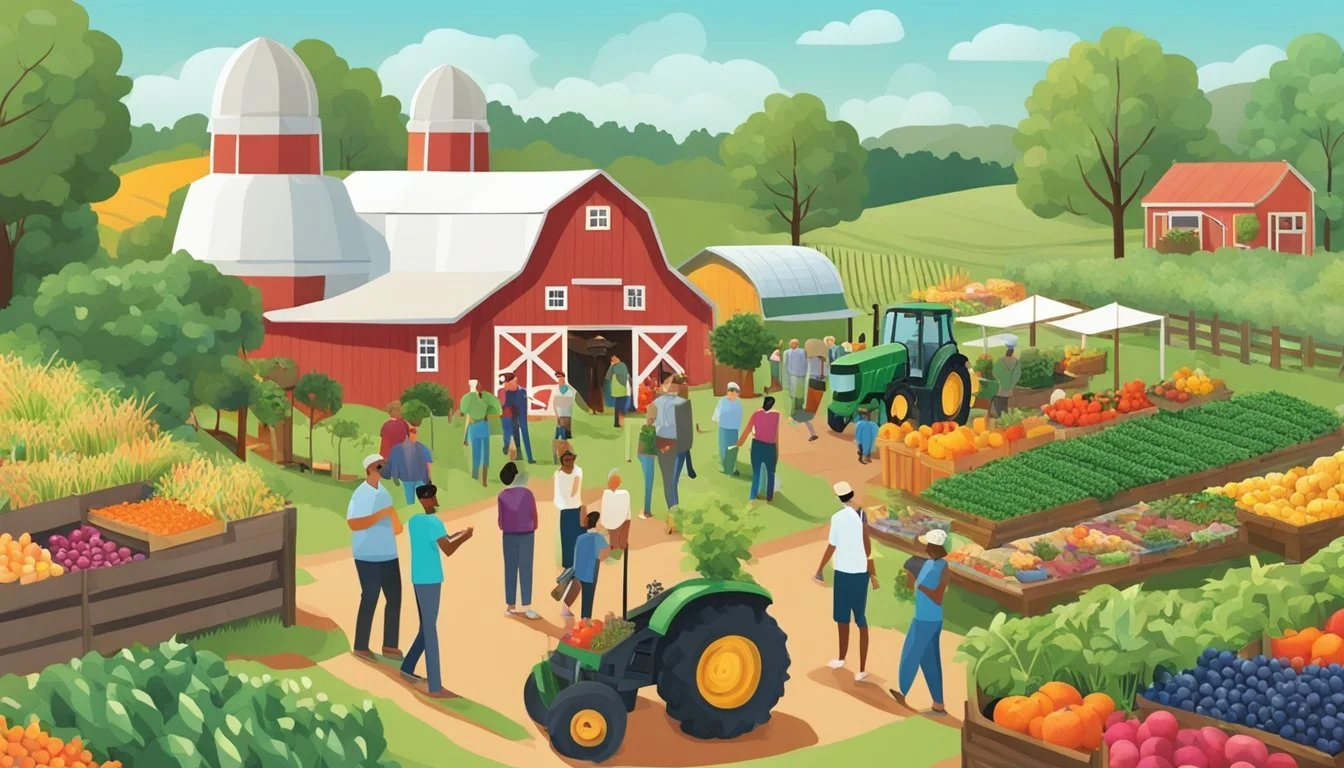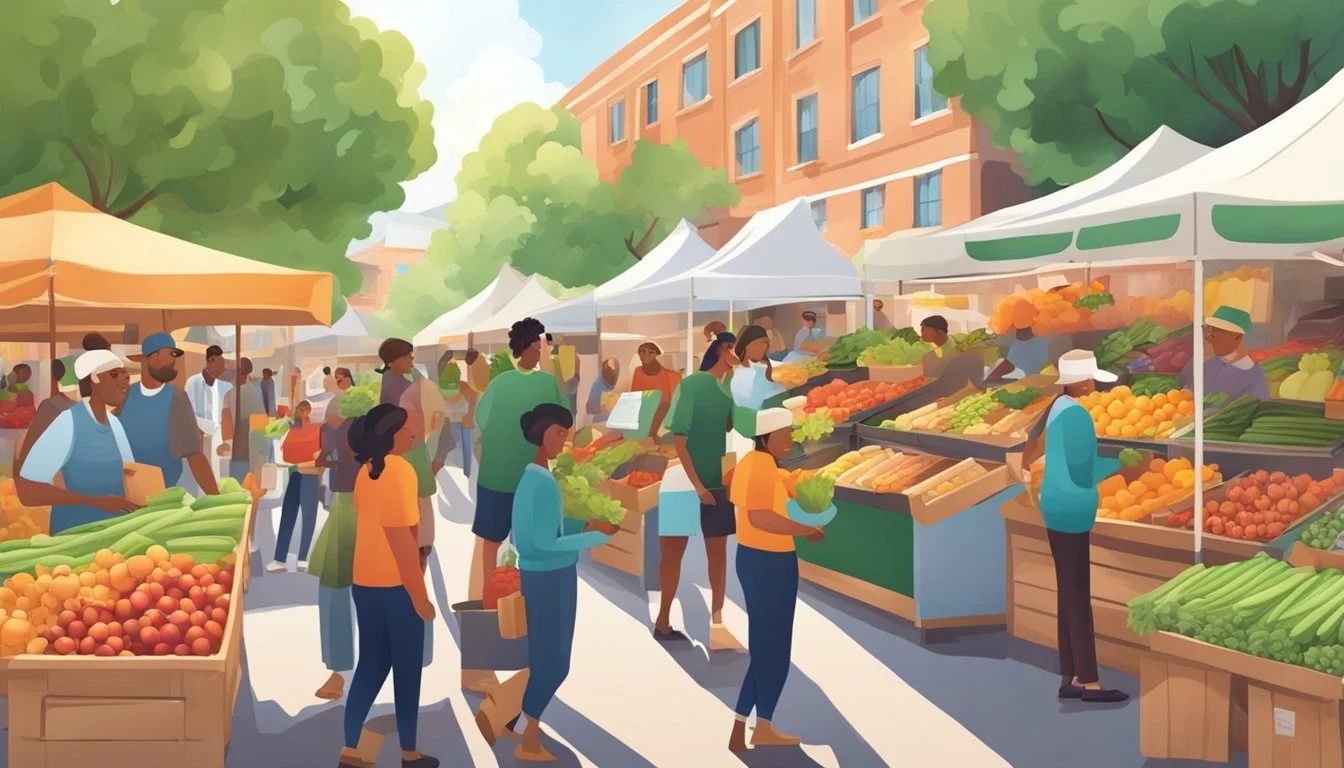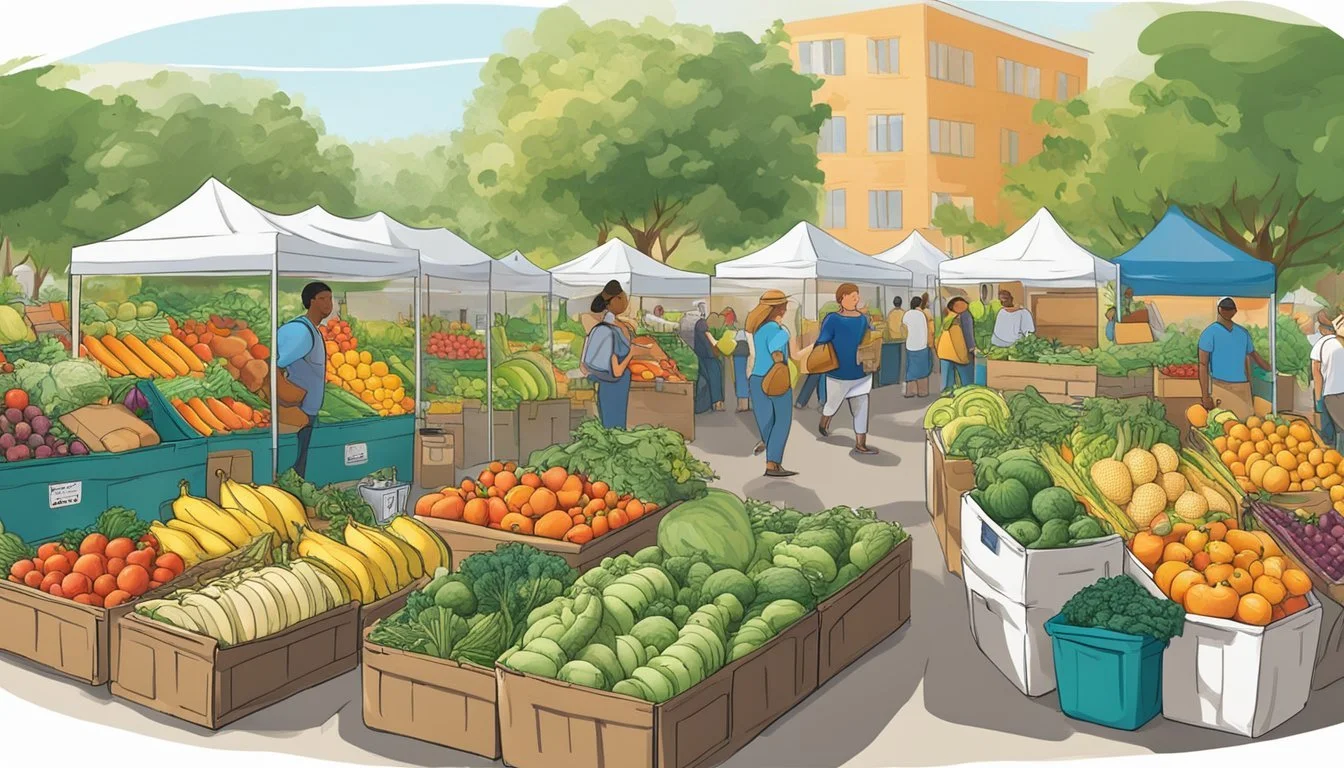Community Supported Agriculture (CSA) in Gainesville, FL
A Guide to Local Farm Shares
Community Supported Agriculture, commonly known as CSA, has taken root in Gainesville, Florida, offering residents a chance to directly support local farming operations. Through this model, members of the community invest in a farm's production by purchasing shares of the harvest in advance. This upfront funding allows farmers to plan for the season, purchase seeds, and cover other operational costs. In return, members receive fresh, often organic, produce regularly throughout the farming season. This symbiotic relationship not only provides financial stability for farmers but also fosters a closer connection between consumers and the source of their food.
In Gainesville, a city with a robust local food movement, CSAs are thriving. This approach aligns well with the region's commitment to sustainable practices and a strong local economy. Consumers benefit from access to seasonal fruits and vegetables while supporting Gainesville's agricultural community. The structure of CSA programs varies, with some offering weekly pickups and others providing more flexible arrangements. This has created a versatile and resilient local food system that enriches the community's social fabric as well.
With various farms around the Gainesville area participating in CSA programs, residents have multiple options for engaging with local agriculture. CSA members typically enjoy a wide array of produce, sharing in both the risks and bounties of agricultural production. This direct farm-to-table supply chain ensures that the local economy is bolstered by keeping food dollars circulating within the community. Additionally, participating in a CSA program educates consumers about seasonal eating and the challenges of small-scale farming, enhancing the appreciation for sustainable agricultural practices in Florida's changing climate.
What Is Community Supported Agriculture
Community Supported Agriculture (CSA) represents a partnership between farmers and consumers in which members fund farming operations upfront, sharing both the costs and the bounties of food production. This model emphasizes sustainability and mutual support, fostering a closer link between the growers and their community.
History of CSA in Gainesville
The CSA model gained traction in Gainesville as local farmers and consumers sought a closer connection and a more sustainable approach to agriculture. The University of Florida, located in Gainesville, has played a significant role in supporting and educating about the merits and practices of CSAs. This educational push has nurtured a growing network of CSAs in the region, aiming to provide fresher produce to consumers and a stable income for farmers.
Benefits to Consumers and Farmers
Consumers benefit from CSAs as they receive fresh, locally-sourced produce, often at competitive prices. By participating in a CSA, they invest directly in the stewardship of local farmland and the success of their local farmers.
Freshness and Quality: Access to produce at the peak of freshness and with high nutritional value.
Connection with the Land: An enriched understanding of where and how their food is grown.
Farmers benefit through financial security and community engagement.
Upfront Capital: Pre-season funding helps cover the initial costs of the farming operation.
Risk Sharing: A shared model wherein consumers, understanding agricultural risks, support farmers throughout the season irrespective of crop yields.
This symbiotic relationship enhances community resilience and bolsters an ecosystem of local food production centered around cooperation and sustainability.
How CSAs Work
In Gainesville, FL, Community Supported Agriculture programs bridge the divide between residents and locally-produced, often organic-certified food. This direct-to-consumer model benefits both consumers and farm operations.
The CSA Model
The CSA model is a partnership between a farm operation and its community. Local residents purchase shares of a farm’s harvest in advance, essentially investing in the farm’s production for a season. This upfront capital helps the farm cover initial production costs. In return, members receive a weekly portion of the farm's harvest, reflecting the local growing season and the conditions unique to the region.
An organic-certified CSA adheres to organic farming practices, promising members the dual satisfaction of supporting sustainable agriculture while enjoying organically grown produce. The typical share might include a diverse selection of vegetables and fruits, and sometimes added farm products like honey or eggs.
Memberships and Operations
Memberships require an upfront payment, creating a financial foundation that allows the farm to plan and operate effectively. The collaboration supports the CSA in fostering a local food system and championing organic farming methods.
Membership Aspect Detail Cost Varies by CSA program; reflects season length and share size Pick-up/Delivery Members collect their shares at designated locations or receive home deliveries Duration Generally spans the main growing season; varies by farm Share Content Often showcases 4-6 produce items per week
CSAs in Gainesville operate with seasonal flexibility, ensuring that members always receive what is freshly harvested. Through memberships, both Gainesville residents and farmers engage in a symbiotic relationship where risks and rewards of food production are shared.
Featured Gainesville CSA Farms
Gainesville, FL boasts a vibrant community of CSA farms where local farmers offer fresh vegetables and organic products directly to consumers. These farms are pivotal in supporting both sustainable agriculture and the local economy.
Swallowtail Farm
Swallowtail Farm, situated in southeast Gainesville, is enveloped by a verdant landscape featuring live oaks and a variety of native flora and fauna. They provide a selection of fresh produce as part of their CSA program, embodying the ethos of connecting the community to the rhythm of natural, farm life.
Siembra Farm
Siembra Farm is known for its contribution to Gainesville's local food scene with a weekly CSA subscription. They strive to make organic products accessible at Gainesville markets, championing the importance of local farm initiatives and sustainable practice.
Frog Song Organics
Frog Song Organics, located near Gainesville, emphasizes ecological farming methods to produce a diverse range of vegetables and fruits. Their CSA members receive a bountiful supply of these organic products, reflecting the farm's commitment to fostering a healthy community.
The Family Garden
The Family Garden is another integral part of Gainesville's CSA offerings, dedicated to providing certified organic vegetables. They focus on transparent farming practices ensuring that customers receive the freshest produce while supporting local farmers and sustainable agriculture.
Each farm has its own unique approach to Community Supported Agriculture, yet all share a commitment to organic farming and fostering closer ties between consumers and food producers in the Gainesville region.
Local Farming and Environment
In Gainesville, Florida, local farming initiatives prioritize sustainable practices and land stewardship to mitigate their environmental impact. These efforts are at the forefront of community-supported agriculture (CSA) operations, ensuring that consumer support directly benefits eco-friendly farming.
Sustainable Practices
Sustainability is integral to CSA farms near Gainesville. These farms often adopt organic methods, reducing chemical usage that can harm the ecosystem. For example, a number of Gainesville CSA farms have received organic certification, signifying their commitment to avoiding synthetic pesticides and fertilizers. The direct correlation between these practices and the reduced environmental footprint bolsters both the ecological health of the farming land and the quality of produce offered to consumers.
Farmers within the community are supporting sustainable techniques such as:
Crop rotation to maintain soil health
Water conservation measures
Utilization of renewable energy sources
Encouraging biodiversity through the planting of various crop types
Land Stewardship
Land stewardship by Gainesville farmers underscores their respect for the environment. Stewardship involves careful management of land resources to prevent degradation and to preserve the land for future generations. Organic certification requires not just the absence of synthetic inputs but also a proactive approach to maintaining soil quality and ecological balance.
Farmers are seen:
Engaging in soil conservation practices
Planting native species to support local wildlife habitats
Minimizing soil erosion by maintaining ground cover
Preserving water quality through buffer zones and proper waste management
By focusing on land stewardship, CSA farms in the Gainesville area contribute to long-term environmental sustainability, reinforcing their role as responsible custodians of the land.
CSA Membership Advantages
Community Supported Agriculture (CSA) memberships in Gainesville, FL offer tangible benefits that impact the local economy, individual health, and community cohesion. Members receive a regular supply of produce directly from local farms, ensuring economic, health, and social benefits.
Promoting Local Economy
By participating in a CSA, members directly support local farmers, bolstering the local economy. Money spent on memberships circulates within the community, aiding in the financial sustainability of small-scale farms. This model empowers local producers to maintain their operations and contribute to a more resilient local food system.
Health and Freshness
Members benefit from the freshness of produce that is often harvested within a day of pickup, maximizing nutrient content and flavor. The Gainesville Health Department supports the consumption of fresh, local produce as a means to improve dietary habits. Access to such high-quality, fresh foods can lead to better health outcomes for consumers.
Community Connection
CSA memberships engender a strong community connection, creating a sense of belonging among members and farmers. This relationship fosters a shared commitment to sustainable practices and often leads to educational opportunities about food production. A CSA is not just a source of fresh food but a way to become part of a community that values consumer benefits and the health of both people and the environment.
Legal and Regulatory Framework
In Gainesville, FL, the legal and regulatory framework for Community Supported Agriculture (CSA) demands adherence to both federal and local guidelines. These regulations are crucial for the operation, certification, and sale of produce within CSAs.
USDA and Health Department Standards
The United States Department of Agriculture (USDA): CSAs in Gainesville that label their produce as Organic Certified must comply with USDA organic standards. These standards are detailed and encompass a range of requirements including soil quality, animal raising practices, pest and weed control, and use of additives.
Organic Certification Process:
Application: A detailed account of the farm’s practices must be provided.
Inspection: An accredited agent reviews these practices on-site.
Review: Compliance with USDA organic standards is assessed.
Certification: Successful farms can market their produce as organic.
Health Department: CSAs also fall under the purview of local health departments. They must ensure:
Safe handling and distribution of produce.
Cleanliness of facilities.
Adherence to food safety standards to prevent contamination.
All CSA operators in Gainesville are encouraged to keep updated with legal obligations and to maintain proper health standards to ensure that they operate within the legal framework. It is often advisable for them to seek advice from legal experts to establish and maintain their legal status, particularly when starting a new CSA.
Joining a CSA in Gainesville
Residents of Gainesville have the opportunity to enjoy fresh, locally-sourced produce by joining one of the various CSA programs available in the area. Each CSA offers unique subscription details and pick-up options tailored to the needs of its members.
Choosing the Right CSA
When selecting a CSA in Gainesville, prospective members should consider factors such as organic certification, the range of produce offered, and the farm's commitment to sustainable practices. For example, the Gators CSA Program — a collaboration with The Family Garden — provides an organic certified and food justice certified option. Swallowtail Farm offers CSA subscriptions that cater to the members' seasonal needs with the promise of fresh vegetables and other farm products.
Subscription and Pick-Up Options
The subscription to a CSA generally involves purchasing a share upfront for a season's worth of produce. This investment helps support local farms and allows members a regular supply of fruits and vegetables. Pick-up options vary by CSA.
Gators CSA Program: Fresh produce delivered to campus for easy access.
Swallowtail Farm: Members may pick up their share directly from the farm or at designated locations in Gainesville.
Gainesville Giving Garden: Offers weekly pick-up of locally-grown produce in Gainesville.
Members should verify the pick-up locations and times with their chosen CSA to ensure they can retrieve their produce conveniently.
CSA Related Events and Education
Community Supported Agriculture (CSA) in Gainesville, FL, offers not just local produce, but also a chance for community members to engage with their food sources through various educational programs and events. These opportunities help participants understand the value of local food, the farming process, and sustainable agriculture.
Farm Tours and Workshops
Swallowtail Farm CSA, located in southeast Gainesville, organizes farm tours and workshops aimed at educating visitors about organic farming and sustainable food systems. These tours provide an immersive experience, allowing the community to see firsthand where and how their food is grown. Workshops might cover topics such as composting, soil health, or planting strategies — key aspects of successful organic farming.
Regular Farm Tours: Ideal for families and individuals interested in learning about organic farming practices and meeting the people behind their food.
Specialized Workshops: Offer in-depth knowledge on specific aspects of farming, such as pest management or crop rotation.
Cooking Classes and Recipes
Alongside farm education, CSA programs in Gainesville offer cooking classes highlighting how to prepare seasonal produce. These classes are not only instructional but also interactive, providing community members with recipes that turn the fresh, local produce from their CSA shares into delicious meals.
Cooking Classes: Hosted by skilled chefs, these classes typically guide participants through the creation of dishes, emphasizing the flavors of locally-sourced ingredients.
Seasonal Recipes: Often shared with CSA members to inspire home cooking with ingredients that are at the peak of their freshness.
Through these events and programs, Gainesville CSAs help to foster a well-informed community, aware of the benefits and methods of local, sustainable agriculture.







